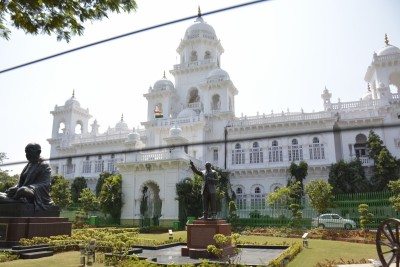
Hyderabad, The stage is set for a stormy Telangana legislature session beginning on Friday.
The Assembly and Legislative Council will meet with strict adherence to Covid-19 safety guidelines, it was decided at a meeting of presiding officers of both the houses with senior officials.
Assembly Speaker Pocharam Srinivas Reddy and Council Pro-tem Chairman Bhoopal Reddy reviewed the arrangements for the session.
Legislative Affairs Minister Vemula Prashanth Reddy, Chief Secretary Somesk Kumar, Director General of Police M. Mahender Reddy and other officials attended the meeting.
The Speaker directed the officials to ensure that Covid protocol is strictly followed. He sought the assistance of officials of all the departments in conducting the session in a transparent manner.
The Business Advisory Committee will meet on Friday discuss the duration of the session.
The state government plans to introduce five draft bills, including a Revenue Registration Act, and Housing Development Corporation Act, in the session, which it plans to extend for at least one week.
The session, being held after six months, is likely to be stormy. This is the first session after the Nagarjuna Sagar by-election and after the exit of former minister E. Rajender from the Telangana Rashtra Samithi (TRS).
With the agenda for the session will be decided by the BAC, the TRS government wants a full-fledged debate on Dalit Bandhu scheme, which was launched on pilot basis in Huzurabad Assembly constituency, four mandals in four assembly constituencies and Chief Minister K. Chandrasekhar Rao's adopted village Vasalamarri.
Under the scheme, the government is depositing Rs 10 lakh in the bank account of each Dalit family.
The opposition Congress and the BJP have been demanding a similar scheme for backward classes. The TRS is likely to hit back demanding them to implement Dalit Bandhu like schemes in states ruled by them.
The government is likely to make a statement on river water sharing issues with Andhra Pradesh and the row over alleged illegal projects taken up by the neighbouring state.


.jpeg)

